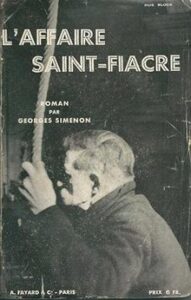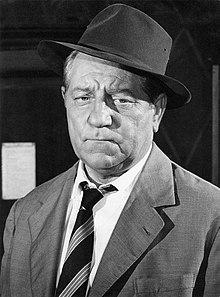Maigret et l’Affaire Saint-Fiacre **** (1959, Jean Gabin, Michel Auclair, Valentine Tessier, Robert Hirsch, Paul Frankeur, Michel Vitold) – Classic Movie Review 12,289
‘The day of judgement has arrived. You will die by the end of the Ash Wednesday service.’ This anonymous message sent to his old friend the Countess (Valentine Tessier) sees Inspector Maigret (Jean Gabin) take the train to the village of Saint-Fiacre where he was born.
Jean Gabin stars for the second time as the fictional police detective Inspector Jules Maigret in director Jean Delannoy’s engrossing 1959 follow-up French crime film Maigret et l’affaire Saint-Fiacre.
Adapted from the novel L’Affaire Saint-Fiacre by the Belgian writer Georges Simenon, it tells how Maigret returns by train to his childhood village of Saint-Fiacre where his father was estate manager for the family owning the château. His old friend the nice old widowed Countess of Saint-Fiacre (Valentine Tessier) has summoned him urgently after receiving an anonymous letter saying she will die next day, Ash Wednesday.
The Countess welcomes him to stay for a couple of days in the run-down château, whose contents are being sold off by her young assistant Lucien Sabatier (Robert Hirsch) and its lands by the current estate manager Gautier (Camille Guérini) and his bank clerk son Émile (Serge Rousseau), supposedly to fund the countess’s alcoholic playboy son Maurice (Michel Auclair), who rarely visits his ailing mother.
Foolish, then, of The Countess to go to the village church for an early morning celebration of Ash Wednesday, for mass and to receive the sacrament from the shifty parish priest Father Jodet (Michel Vitold). And surprisingly careless of the normally canny and fastidious Maigret not to have protected her. But then otherwise we wouldn’t have a murder mystery, would we?
There’s a lot of mystery and tension in this well-plotted, well-realised movie, with a rich supply of dodgy-seeming suspects, a lot of smart sparring talk, a noir mood of death, despair and disappointment, and even an Agatha Christie-style finale with a macabre dinner party organised for all the murder suspects. The tone is serious and dark. A deep sadness covers the landscape. There’s an idea of a better time long ago when Maigret was growing up and the world going to hell through nothing more than basic greed and dissolution.
Gabin is perfect as Maigret. It is fortunate that he made a sequel. The performance is even more polished and layered than in the first film, Maigret Sets a Trap [Maigret tend un piège] (1958). It really is tremendous, with not a hint of acting or ham anywhere when it would be so easy to over-egg the pudding. His nostalgia-tinged scenes at the start of the film with Valentine Tessier as the Countess are superbly sensitive and affecting, and again when he confronts a church choirboy like he used to be and an old shopkeeper in a store from his childhood. Bravo, Monsieur Gabin.
Delannoy achieves the film in style, with a sense of cinema and quiet, compelling dynamism, driving the story along intensely, helped by stylish camerawork and equally stylish art direction. It is easy to imagine a flat, dull TV version of this story, because this film is the opposite in every way. The story is strong enough, but it won’t really work on screen without some magic, and here it is with Gabin and Delannoy.
There is more good news. Gabin went on to make a third movie as Maigret: Maigret Sees Red (1963).
In 1962 the novel was made into an episode of the first Maigret television series starring Rupert Davies, and in 1992 it was made into an episode of an ITV Maigret series.
The cast are Jean Gabin as police Commissioner Maigret, Michel Auclair as Maurice de Saint-Fiacre, Valentine Tessier as Countess of Saint-Fiacre, Robert Hirsch as Lucien Sabatier, Paul Frankeur as Doctor Bouchardon, Michel Vitold as the parish priest Father Jodet, Camille Guérini as the estate manager Gautier, and Serge Rousseau as the manager’s son Émile Gautier.
Saint Fiacre is the patron saint of the commune of Saint-Fiacre, Seine-et-Marne, France. He is the patron of growers of vegetables and medicinal plants, and gardeners. He is the patron of victims of venereal disease, victims of hemorrhoids and fistulas, taxi drivers, box makers, florists, hosiers, pewterers, tile-makers, and those suffering from infertility. He is invoked to heal people suffering from various infirmities, because of his reputed skill with medicinal plants.
© Derek Winnert 2022 Classic Movie Review 12,289
Check out more reviews on http://derekwinnert.com



